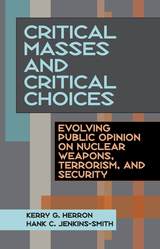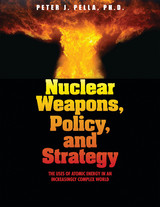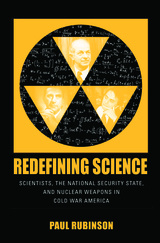
Critical Masses and Critical Choices examines American attitudes on issues of national and international security. Based on over 13,000 in-depth interviews conducted over a ten-year period, Kerry Herron and Hank Jenkins-Smith have created a unique and rich set of data providing insights into public opinion on nuclear deterrence, terrorism, and other security issues from the end of the Cold War to the present day. Their goal is to shed light not only on changes in public opinion about a range of security-related policy issues, but also to gauge the depth of the public’s actual understanding of these matters. Prior to this study, the predominant view held that the American people were incapable of articulate and consistent thought on complex political subjects. This book overturns that notion and demonstrates the sometimes surprisingly cogent positions held by ordinary members of the public on intricate national issues.
The book’s solid data, based on long-term studies, combined with crisp writing and often startling conclusions, will appeal to a wide range of readers: scholars, journalists, and policy makers. Critical Masses and Critical Choices is the definitive account of the change in public perceptions on security threats and reactive strategies from the early 1990s to the post 9/11 period. This broad and highly original study will prove an indispensable tool for policy makers and scholars alike.

During the Cold War, many believed that the superpowers shared a conception of strategic stability, a coexistence where both sides would compete for global influence but would be deterred from using nuclear weapons. In actuality, both sides understood strategic stability and deterrence quite differently. Today’s international system is further complicated by more nuclear powers, regional rivalries, and nonstate actors who punch above their weight, but the United States and other nuclear powers still cling to old conceptions of strategic stability.
The purpose of this book is to unpack and examine how different states in different regions view strategic stability, the use or non-use of nuclear weapons, and whether or not strategic stability is still a prevailing concept. The contributors to this volume explore policies of current and potential nuclear powers including the United States, Russia, China, India, Iran, Israel, Pakistan, and Saudi Arabia. This volume makes an important contribution toward understanding how nuclear weapons will impact the international system in the twenty-first century and will be useful to students, scholars, and practitioners of nuclear weapons policy.

Moral theologians, defense analysts, conflict scholars, and nuclear experts imagine a world free from nuclear weapons
At a 2017 Vatican conference, Pope Francis condemned nuclear weapons. This volume, issued after the 60th anniversary of the Cuban Missile Crisis, presents essays from moral theologians, defense analysts, conflict transformation scholars, and nuclear arms control experts, with testimonies from witnesses. It is a companion volume to A World Free from Nuclear Weapons: The Vatican Conference on Disarmament (Georgetown University Press, 2020).
Chapters from the perspectives of missile personnel and the military chain of command, industrialists and legislators, and citizen activists show how we might achieve a nuclear-free world. Key to this transition is the important role of public education and the mobilization of lay movements to raise awareness and effect change. This essential collection prepares military professionals, policymakers, everyday citizens, and the pastoral workers who guide them, to make decisions that will lead us to disarmament.

Are nuclear arsenals safe from cyber-attack? Could terrorists launch a nuclear weapon through hacking? Are we standing at the edge of a major technological challenge to global nuclear order? These are among the many pressing security questions addressed in Andrew Futter’s ground-breaking study of the cyber threat to nuclear weapons.
Hacking the Bomb provides the first ever comprehensive assessment of this worrying and little-understood strategic development, and it explains how myriad new cyber challenges will impact the way that the world thinks about and manages the ultimate weapon. The book cuts through the hype surrounding the cyber phenomenon and provides a framework through which to understand and proactively address the implications of the emerging cyber-nuclear nexus. It does this by tracing the cyber challenge right across the nuclear weapons enterprise, explains the important differences between types of cyber threats, and unpacks how cyber capabilities will impact strategic thinking, nuclear balances, deterrence thinking, and crisis management. The book makes the case for restraint in the cyber realm when it comes to nuclear weapons given the considerable risks of commingling weapons of mass disruption with weapons of mass destruction, and argues against establishing a dangerous norm of “hacking the bomb.”
This timely book provides a starting point for an essential discussion about the challenges associated with the cyber-nuclear nexus, and will be of great interest to scholars and students of security studies as well as defense practitioners and policy makers.

At the request of the President of Harvard University, six Harvard scholars have joined forces to write a book that lays out the facts about nuclear weapons for all concerned citizens who want to think through the nuclear dilemma for themselves. Living with Nuclear Weapons is written by specialists for the general reader. It conveys crucial information clearly, concisely, and without technical jargon.
Living with Nuclear Weapons presents all sides of the nuclear debate while explaining what everyone needs to know to develop informed and reasoned opinions about the issues. Among the specifics are a history of nuclear weaponry; an examination of current nuclear arsenals; scenarios of how a nuclear war might begin; a discussion of what can be done to promote arms control and disarmament; a study of the hazards of nuclear proliferation; an analysis of various nuclear strategies; and an explanation of how public opinion can influence policy on the nuclear arms question.

North Korea is perilously close to developing strategic nuclear weapons capable of hitting the United States and its East Asian allies. Since their first nuclear test in 2006, North Korea has struggled to perfect the required delivery systems. Kim Jong-un’s regime now appears to be close, however. Sung Chull Kim, Michael D. Cohen, and the volume contributors contend that the time to prevent North Korea from achieving this capability is virtually over; scholars and policymakers must turn their attention to how to deter a nuclear North Korea. The United States, South Korea, and Japan must also come to terms with the fact that North Korea will be able to deter them with its nuclear arsenal. How will the erratic Kim Jong-un behave when North Korea develops the capability to hit medium- and long-range targets with nuclear weapons? How will and should the United States, South Korea, Japan, and China respond, and what will this mean for regional stability in the short term and long term? The international group of authors in this volume address these questions and offer a timely analysis of the consequences of an operational North Korean nuclear capability for international security.

In this comprehensive introduction to nuclear physics, related national and international policy issues from Dr. Pete Pella, Gettysburg College nuclear physicist, educators will find a definitive textbook on the peaceful and military uses of nuclear energy. Pella traces both the scientific evolution and political history of nuclear power and arms, bringing us to current events including nuclear plant development, status of treaties, U.S.-Russia disarmament efforts, and policing of rogue nations. Must reading for the world’s citizens concerned about these vital issues.

Redefining Science shows that the government achieved its Cold War "consensus" only by active opposition to powerful dissenters and helps explain the current and uneasy relationship between scientists, the public, and government in debates over issues such as security, energy, and climate change.

On November 10, 2017, Pope Francis became the first pontiff in the nuclear era to take a complete stand against nuclear weapons, even as a form of deterrence. At a Vatican conference of leaders in the field of disarmament, he made it clear that the possession of the bomb itself was immoral. A World Free from Nuclear Weapons presents the pope’s address and original testimony from Nobel Peace Prize laureates, religious leaders, diplomats, and civil society activists.
These luminaries, which include the pope and a Hiroshima survivor, make the moral case against possessing, manufacturing, and deploying nuclear arms. Drew Christiansen, a member of the Holy See delegation to the 2017 United Nations conference that negotiated the Treaty to Prohibit Nuclear Weapons, helps readers to understand this conference in its historical context.
A World Free from Nuclear Weapons is a critical companion for scholars of modern Catholicism, moral theology, and peace studies, as well as policymakers working on effective disarmament. It shows how the Church’s revised position presents an opportunity for global leaders to connect disarmament to larger movements for peace, pointing toward future action.
READERS
Browse our collection.
PUBLISHERS
See BiblioVault's publisher services.
STUDENT SERVICES
Files for college accessibility offices.
UChicago Accessibility Resources
home | accessibility | search | about | contact us
BiblioVault ® 2001 - 2024
The University of Chicago Press









